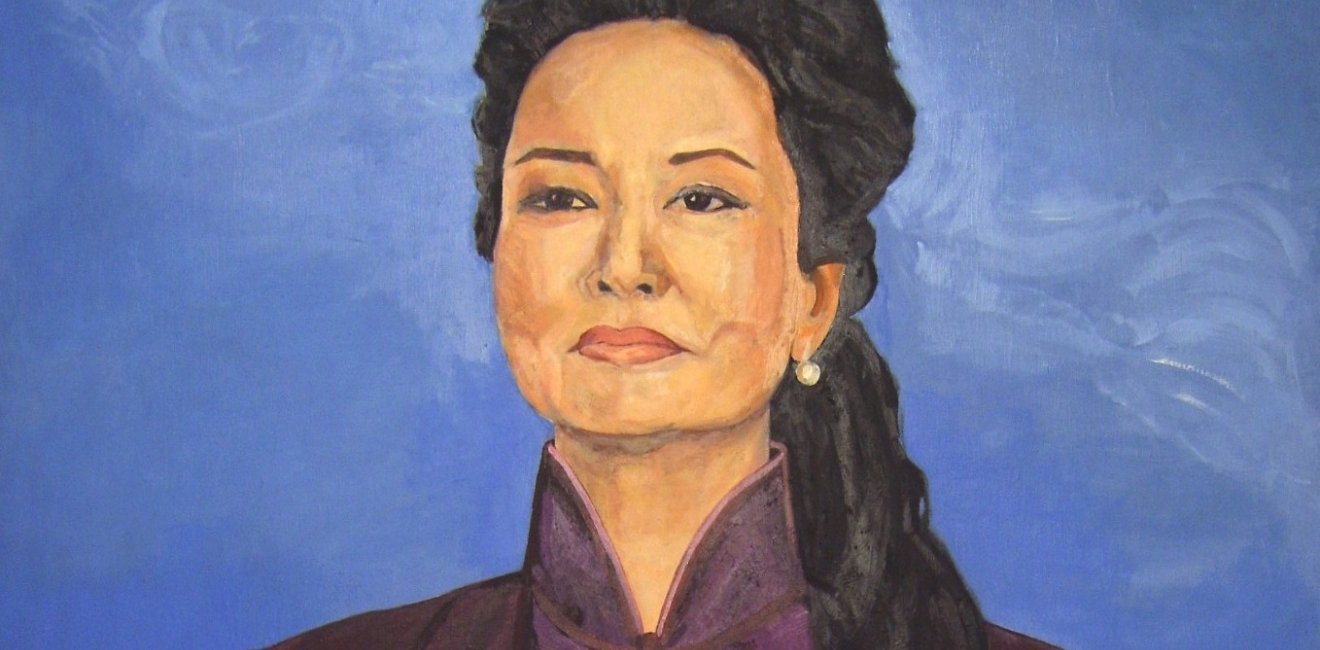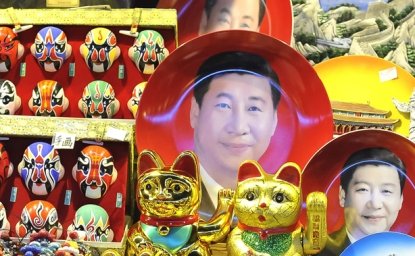“I have been an ordinary warrior of the fine arts”– Peng Liyuan, 2007
China Central Television’s annual Lunar New Year Gala is a campy, living karaoke video. The program’s formula of colorful costumes, synchronized back-up dancers, and military bands hasn’t changed much since its first airing in 1983. But after the firecrackers fade, the spirit of the CCTV Lunar Gala lingers through the year, most prominently in the persona of China’s First Lady, Peng Liyuan.
“The People are the Mountains, The People are the Sea, The People are the fountainhead of the Communist Party.” Thus belted Peng Liyuan in her former life as a diva in the Chinese People’s Liberation Army. Clad in a red silk ball gown, she sashayed across the stage as state television producers rolled video of schoolchildren waving red flags. Peng hasn’t graced China’s soundstages since she became First Lady in 2012, but her dedication to linking People and Party has not wavered.
Peng Liyuan is the first political wife in China to officially take the title of First Lady, or di yi fu ren, a term borrowed from the United States. Peng has put her own twist on the role by leveraging her prolific career in the Cultural Division of the People’s Liberation Army. In 2013, when her husband, Communist Party (CCP) General Secretary Xi Jinping, began his first term, Peng became a leading cultural component of Xi’s soft power calculus. He has joined her fame to his domestic and international goal of winning support for the primacy of the State in Chinese culture.
As First Lady, Peng, with the help of government handlers, has used her image to buttress Xi’s “China Dream” campaign and drive to “rejuvenate” Chinese civilization by binding it more closely to the authority of the Communist Party. Peng’s style appeals to most Chinese, but in substance her fame is employed to expand China’s political soft power.
China’s Long Wait for a First Lady
Peng Liyuan’s 20th century predecessors have ranged from the glamorous, to the dangerous, to the drab.
Soong Mei-ling, known in the West as Madame Chiang Kai-shek, was integral to Chinese foreign relations in the Republican period. She began her long diplomatic career over dinner conversations with Franklin and Eleanor Roosevelt, and ended it in 1999 with an address to the U.S. Congress. Soong was an American-educated cosmopolitan who read the Bible and The New York Times daily, dressed to the nines, and was hailed by American press as “the personification of free China.” She was the pioneer of Chinese first-lady diplomacy and a “a dazzling and imperious politician” whose legacy Peng Liyuan draws on even though the political party she advocated for remains an adversary of the Chinese state.
Wang Guangmei was the cultured and elegant wife of Premier Liu Shaoqi. When Liu fell from power during the Cultural Revolution, Wang paid a devastating cost. To mock the elegant white cheongsam and pearls she wore during a 1963 Indonesia visit; the Red Guard foot soldiers of her political rival Jiang Qing publically forced Wang to the ground, wrestled a stylish dress over her bulky clothes, and clasped a “pearl” necklace made of ping pong balls around her neck.
Jiang Qing (Madam Mao), who once claimed to be “Chairman Mao’s dog,” held the most political power out of any Chinese political wife. During the Cultural Revolution, she persecuted other actors and artists and forced the production of propagandistic “model operas.” Later reviled and arrested as a member of the “Gang of Four,” Jiang committed suicide in prison in 1991. Her notoriety put an end to prominent roles for political wives and reinforced the Chinese belief that powerful women, like Tang Dynasty Empress Wu Zetian and Qing Dowager Cixi, were conniving and inept. The moral of Jiang Qing and Wang Guangmei’s stories was clear: if political spouses draw attention to themselves, they may end up in the crosshairs of political enemies.
The political spouses that followed Jiang Qing were dowdy and low key, and the Party seemed to like it that way. Deng Xiaoping’s third wife, Zhuo Lin, was an able but unglamorous Party apparatchik. Wang Yeping, Jiang Zemin’s spouse, graduated from Shanghai International Studies University and worked as an administrator at the Shanghai Electrical Apparatus Research Institute. Liu Yongqing, an urban planner by trade, married Hu Jintao shortly after they graduated from Tsinghua University. Like their husbands, Wang Yeping and Liu Yongqing were technocrats. Mostly written in as afterthoughts in foreign visits and events, these women were not known for their charm and were never offered to the public as symbols of the Chinese state.
Peng’s Global Stage
When Peng Liyuan appears at Xi Jinping’s side at summits or names panda cubs with Michelle Obama, her activities and outfits make headline news in China. Through ribbon cuttings, cultural ceremonies, and other non-political events, Peng and her handlers have carefully crafted an image of refined—and largely silent—femininity and marital bliss that humanize Xi Jinping and China even as Xi pursues an ideological crackdown at home and assertive policies abroad. It helps that the story of Peng’s fame is meritocratic; she seems to have risen through the PLA cultural ranks on talent alone.
The title of First Lady originated in the United States during the Revolutionary War and evolved through eras in which it denoted the homemaker-in-chief, mother-of-country, and political confidant. As Chinese First Lady, Peng is an integral part of Xi’s “China Dream” and is deployed as China’s reassuring face to the world.
Peng became famous before her husband did. Before Xi’s political star rose, she had performed in more than 50 countries. Her domestic media appearances were more popular than his. None of her appearances moved China quote like the nationally broadcast Chinese New Year’s anthems that she sang year after year. As both an artist and a military officer, her costumes ranged from voluminous ball gowns to silken qipaos with high mandarin collars; but it was Peng’s People’s Liberation Army uniform that also defined her as a performer. Records, video clips, and interviews with the younger Peng remain available online and her biography is widely circulated in state media, online publications, and video spots. The framing of Peng Liyuan as both helpmate and foil to Xi Jinping is a key factor in her calculated appeal. A June 2013 Bloomberg profile of Peng called her a necessary part of a “package” that helped Xi appear as a “man of the people. In a 2014 profile, China’s People’s Daily claimed that: “Peng has always been among us. Her experience is the best illustration of the China Dream (她一直在我们中间,她的经历是对中国梦的最好诠释).”
As First Lady, Peng has swapped her stage costumes and military uniform for a Westernized wardrobe consisting of tailored skirt suits, fitted jackets, and modest long-sleeved gowns. When her domestic handbags and coats generate sales, pride in “Made in China 2025” (the name of a current economic initiative) is subtly reinforced. Her few interviews, in which she speaks fondly of Xi’s hobbies and their down-to-earth romance, have been characterized as having a “Kate Middleton effect” that forms an intimate bond between ordinary Chinese and China’s first family. When Peng took tea and scones with the Duchess of Cambridge, Chinese state media hailed the meeting for projecting China as a cultured, benevolent, world power—an image that helped Xi Jinping declare a “Golden Era” in U.K.-China relations.
The CCP wants other global observers to draw the same conclusions. It has deployed Peng as a champion of politically safe causes, mostly through ceremonial speeches at the UN, cultural centers, and schools. Peng doesn’t merely soften her husband’s hard edges, but cheerleads China’s rise without the political risks of Jiang Qing’s or the assertiveness of Wang Guangmei. Although she no longer sings publically, her career as a patriotic songstress remains essential to her Peng’s appeal as First Lady.
While Peng Liyuan won’t take the stage at the 2017 Lunar New Year Gala, she will sit at the summit of the cultural and political messages that the Communist Party will promote over the holiday. Her image has been more successfully managed than Xi’s. She is beloved in China as the loyal, classically-dressed mother of the nation and as a champion of educational, artistic, and public health causes. But her symbolic value is even greater than that; to many Chinese, Peng is living proof of the benevolent intentions of their nation.
Any message this beautiful must be good.






